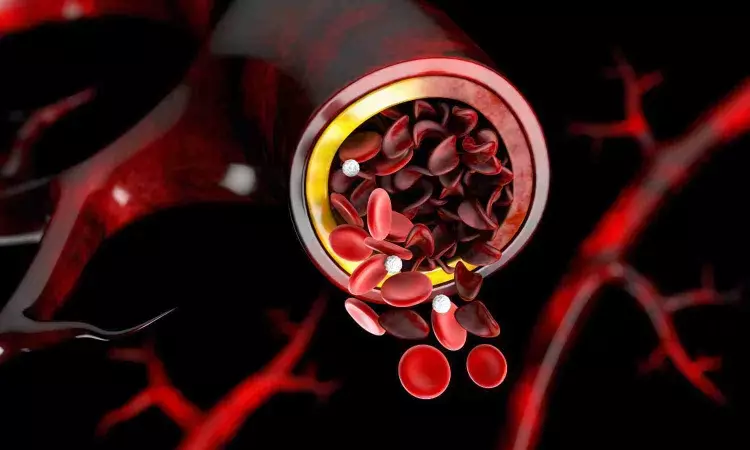- Home
- Medical news & Guidelines
- Anesthesiology
- Cardiology and CTVS
- Critical Care
- Dentistry
- Dermatology
- Diabetes and Endocrinology
- ENT
- Gastroenterology
- Medicine
- Nephrology
- Neurology
- Obstretics-Gynaecology
- Oncology
- Ophthalmology
- Orthopaedics
- Pediatrics-Neonatology
- Psychiatry
- Pulmonology
- Radiology
- Surgery
- Urology
- Laboratory Medicine
- Diet
- Nursing
- Paramedical
- Physiotherapy
- Health news
- Fact Check
- Bone Health Fact Check
- Brain Health Fact Check
- Cancer Related Fact Check
- Child Care Fact Check
- Dental and oral health fact check
- Diabetes and metabolic health fact check
- Diet and Nutrition Fact Check
- Eye and ENT Care Fact Check
- Fitness fact check
- Gut health fact check
- Heart health fact check
- Kidney health fact check
- Medical education fact check
- Men's health fact check
- Respiratory fact check
- Skin and hair care fact check
- Vaccine and Immunization fact check
- Women's health fact check
- AYUSH
- State News
- Andaman and Nicobar Islands
- Andhra Pradesh
- Arunachal Pradesh
- Assam
- Bihar
- Chandigarh
- Chattisgarh
- Dadra and Nagar Haveli
- Daman and Diu
- Delhi
- Goa
- Gujarat
- Haryana
- Himachal Pradesh
- Jammu & Kashmir
- Jharkhand
- Karnataka
- Kerala
- Ladakh
- Lakshadweep
- Madhya Pradesh
- Maharashtra
- Manipur
- Meghalaya
- Mizoram
- Nagaland
- Odisha
- Puducherry
- Punjab
- Rajasthan
- Sikkim
- Tamil Nadu
- Telangana
- Tripura
- Uttar Pradesh
- Uttrakhand
- West Bengal
- Medical Education
- Industry
Children with sickle cell anemia treated with hydroxyurea have less severe or invasive infections

USA: Hydroxyurea significantly reduces infections in children with sickle cell anemia, according to findings from clinical research led by Indiana University School of Medicine investigators and their collaborators in Uganda.
"Hydroxyurea treatment resulted in a remarkable 60% reduction in severe or invasive infections, including malaria, bacteremia, respiratory tract infections and gastroenteritis, among Ugandan children with sickle cell anemia," the researchers reported.
Their latest findings, published in the journal Blood, enhance strong evidence of hydroxyurea’s effectiveness and could ultimately reduce death in children in Africa, the continent most burdened by the disease.
“Our investigation provides powerful justifications for hydroxyurea’s use in children with sickle cell anemia in Africa,” said Dr. Chandy John, the Ryan White Professor of Pediatrics at IU School of Medicine and co-lead investigator of the latest study. “Given the high rates of infection in this region, we hope our evidence will encourage ministries of health to continue supporting and expanding access to hydroxyurea for young patients who can greatly benefit from the treatment.”
Sickle cell anemia is a genetic blood disorder that alters the structure of red blood cells and affects oxygen distribution throughout the body, increasing susceptibility to serious health complications and life-threatening infections. According to the World Health Organization, more than 300,000 children worldwide are born with sickle cell disease each year, with a high prevalence found in African countries.
While hydroxyurea has had U.S. Food and Drug Administration approval as a sickle cell disease treatment for children since 2017, its accessibility and acceptance in Africa have been comparatively limited. As hydroxyurea has become more recognized in African countries for its effectiveness in treating sickle-cell-related complications, John and his colleagues noticed a knowledge gap about the treatment’s effect on infections. This led the research group to incorporate hydroxyurea treatment and analysis into their established clinical trial, Zinc for Infection Prevention in Sickle Cell Anemia.
During the study, the researchers examined the effects of hydroxyurea on 117 children in Uganda and focused on a range of infections. After hydroxyurea treatment, results showed a substantial decrease in the incidence of these infections. Additionally, eight of the nine deaths that occurred in the trial were children whose parents declined hydroxyurea treatment. The only death in a child on hydroxyurea treatment occurred four days after starting treatment, providing insufficient time for hydroxyurea to have an effect.
Of the five children for whom a cause of death was known, all five died of infectious causes. The high death rate in the study, despite expert clinical care by study personnel, provides further evidence of the urgent need for additional interventions to decrease mortality in children with sickle cell disease in Africa.
“Infections commonly precede other complications related to sickle cell anemia and often result in hospitalizations that can lead to death,” said Dr. Ruth Namazzi, site principal investigator, first author on the study and a lecturer in the Department of Pediatrics and Child Health at Makerere University in Uganda. “We believe incorporating hydroxyurea treatment as the standard of care for sickle cell anemia across Africa will not only reduce infections but will more importantly save countless lives.”
Reference:
Ruth Namazzi, Caitlin Bond, Andrea Conroy, Dibyadyuti Datta, Abner Tagoola, Michael J Goings, Jeong Hoon Jang, Russell E. Ware, Robert O Opoka, Chandy C. John, Hydroxyurea reduces infections in children with sickle cell anemia in Uganda, Blood, https://doi.org/10.1182/blood.2023021575,
Dr Kamal Kant Kohli-MBBS, DTCD- a chest specialist with more than 30 years of practice and a flair for writing clinical articles, Dr Kamal Kant Kohli joined Medical Dialogues as a Chief Editor of Medical News. Besides writing articles, as an editor, he proofreads and verifies all the medical content published on Medical Dialogues including those coming from journals, studies,medical conferences,guidelines etc. Email: drkohli@medicaldialogues.in. Contact no. 011-43720751


